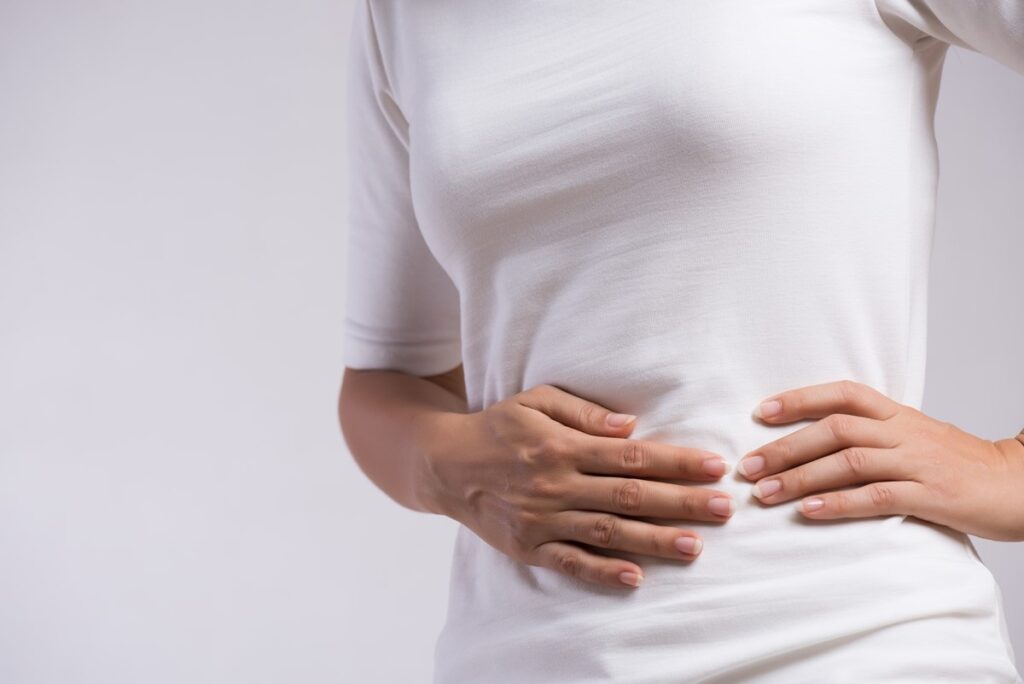There are many possible causes of abdominal distention or swelling. These include fluid retention, irritable bowel syndrome, and infections. However, for most people, bloating is harmless and can be treated at home. In the following article, we will analyse the causes of bloating, how to treat it, and when to visit a gastroenterologist.
Abdominal distention or swelling can be alarming, particularly when it turns out to be very painful. Sometimes, people notice that their belly looks swollen or experience sharp abdominal pain. However, sometimes the cause can be as simple as indigestion or accumulating too much gas in the stomach and intestines.
Causes of abdominal distention
gases
gas in the stomach and intestines is one of the most common causes of bloating. Other possible symptoms include:
- excessive belching
- excessive flatulence
- intense urge to defecate
- nausea
Gas can be caused by:
- certain foods, including cruciferous vegetables like cauliflower, broccoli, and cabbage
- a stomach infection
- chronic diseases, such as Crohn’s disease
- indigestion
Gas bloating ranges from mild discomfort to severe pain. Some people describe feeling like there is something trapped inside their stomachs. In most cases, the gas goes away on its own after a few hours.
Indigestion
sometimes it is called dyspepsia, which is discomfort or pain in the stomach. Most people experience brief bouts of indigestion from:
- eat a lot
- drink alcohol excessively
- medications which irritate the stomach, such as ibuprofen
- a minor stomach infection
Frequent indigestion that doesn’t seem to be associated with food or other apparent causes could signify something more serious. Possible causes include a stomach ulcer, cancer, or liver failure.
Infection
Infections of the stomach, apart from causing gas, also cause:
- diarrhoea
- vomiting
- nausea
- stomach ache
Often, a stomach infection is caused by bacteria such as Escherichia coli or Helicobacter pylori.
However, some people can become severely dehydrated and get worse over days. These people should see a gastroenterologist if bloating has:
- fever
- bloody stools
- vomiting
Small intestinal bacterial overgrowth (SIBO)
The stomach and intestines are home to various bacteria, which help the body digest food. Disturbing these balances can increase harmful bacteria in the small intestine, known as intestinal bacterial overgrowth.
SIBO can cause frequent bloating and diarrhoea and can lead to difficulty digesting food and absorbing nutrients.
Fluid retention
Eating salty foods, having food intolerances, and experiencing changes in hormone levels can cause a person’s body to retain more fluid. As a result, many women experience bloating before their menstrual periods or early in pregnancy.
The swelling due to fluid retention could have a more serious cause, such as diabetes or kidney failure. If you suffer from abdominal distention and it does not go away, visit your gastroenterologist.
food intolerances
Some people feel bloated after eating certain foods, for example, lactose intolerant people with a gluten allergy or celiac disease. The bloating usually goes away independently, but it can be related to diarrhoea or stomach pain.
chronic disorders
Chronic bowel disorders, such as irritable bowel syndrome and Crohn’s disease, can cause bloating. Irritable bowel syndrome and Crohn’s disease can cause gas, diarrhoea, vomiting, and unintentional weight loss.
gastroparesis
it is a disorder that affects regular stomach emptying. The stomach muscles stop working properly, causing food to take longer to digest. Symptoms include:
- abdominal distension
- constipation
- loss of appetite
- acidity
- nausea and vomiting
- pain and discomfort
Gynaecological disorders
Some gynaecological problems cause stomach pain. In some women, endometriosis can cause cramping and bloating. This happens when the uterus lining attaches to the stomach or intestines.
- Constipation
- Constipation often causes bloating. Causes of constipation include:
- dehydration
- not enough fibre in the diet
- food intolerance
- the pregnancy
- certain intestinal disorders
- nutrient deficiencies
- certain medications
Treatments
You can treat bloating, or bloating, safely from home. Some tips that can help you include:
- Over-the-counter medications, including antacids.
- apply a heating pad to the stomach
- drink drinking water
- drink peppermint infusions
- In case of constipation, taking a laxative will relieve this symptom.
Having your list of foods you eat will help control your bloating. This will allow you to know more about your food intolerances so that you can make healthy changes in your lifestyle. By keeping track of what they eat, many people find which foods to avoid can prevent bloating and other gastrointestinal health problems.
When to visit a gastroenterologist?
Rarely, bloating or bloating can be a sign of something more serious. You should visit your gastroenterologist if you suffer from bloating associated with:
- Intense pain
- fever
- vomiting that lasts more than 24 hours
- bloody stools
- a physical injury, such as a blow to the stomach or a car accident
- rapid swelling of the abdomen or anywhere else in the body
- surgery
- liver or kidney failure
You may also like
-
Unlocking the Potential of Vitamin C in Cancer Treatment
-
Have Trust on a Quality and Reputed CBD Companies
-
Can facial optimization do something special for your facial skin?
-
Aspire Vape: A Renowned Brand in the Vaping Industry
-
Unlocking Power And Productivity With Generators: The Benefits Of Using A Generator For Energy Production

